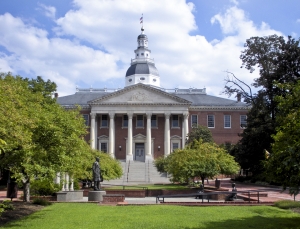 On October 1 the Maryland Redeem Act became state law, and now thousands of individuals can file to expunge prior criminal convictions that were once considered permanent. The Redeem Act is a major breakthrough for those who have struggled to advance in the workplace, obtain professional licenses and secure loans or apartment leases. It provides an avenue for prior defendants to apply for expungement in numerous types of charges, including felony drug cases. In addition to adding more charges to the list of qualifying offenses, the law also shortens the wait time necessary to apply for expungement. The relevant portion of the Redeem Act is codified in the Criminal Procedure section 10-110 of the Maryland statutes, though the section lists the crimes by statute number and not name. It is advisable to have your charging document handy when checking to see if your prior offense qualifies, or you can consult with a Maryland criminal defense lawyer.
On October 1 the Maryland Redeem Act became state law, and now thousands of individuals can file to expunge prior criminal convictions that were once considered permanent. The Redeem Act is a major breakthrough for those who have struggled to advance in the workplace, obtain professional licenses and secure loans or apartment leases. It provides an avenue for prior defendants to apply for expungement in numerous types of charges, including felony drug cases. In addition to adding more charges to the list of qualifying offenses, the law also shortens the wait time necessary to apply for expungement. The relevant portion of the Redeem Act is codified in the Criminal Procedure section 10-110 of the Maryland statutes, though the section lists the crimes by statute number and not name. It is advisable to have your charging document handy when checking to see if your prior offense qualifies, or you can consult with a Maryland criminal defense lawyer.
In this post we’ll go through some of the major changes to the expungement laws, but for a more detailed analysis about your particular situation, feel free to call Maryland expungement lawyer Benjamin Herbst anytime at 410-207-2598. The Herbst Firm handles expungements and petitions for early expungement based on good cause. It’s safe to say that the drug laws have been impacted the most by the Redeem Act, as convictions for possession with intent to distribute are handed out like candy in the courthouses across the state. Many a defendant has accepted a guilty plea to this crime to get out of jail or simply to close the case and move on with life, only to have it severely hinder personal growth in the future. If the criminal defense attorney on the case did not successfully argue for probation before judgment or if a timely motion to modify was not filed within 90 days, the conviction used to last a lifetime. Though as of October 1, there is hope for anyone with an old PWID or distribution charge, as an application to expunge may be filed 7 years after a time served disposition or 7 years after probation or parole has ended. Anyone with a marijuana distribution or PWID conviction can file for expungement 3 years after the disposition or the end of probation or parole if applicable.
Felony theft and burglary may be expunged after 10 years, but other felony charges have yet to be added to the list of crimes that are eligible. This includes motor vehicle theft, which is not one of the offenses that is currently expungable under Maryland law. Gun crimes have also not been added to the list of expungable offense. On the positive side, misdemeanor offenses such as CDS possession not marijuana, burglary in the 4th degree, malicious destruction of property, disorderly conduct, prostitution, obstructing and hindering and various others are expungable after 5 years of the conclusion of the case or the end of probation/parole. Prior convictions for domestically related crimes such as second degree assault and violation of a protective order are not eligible for 15 years. If assault in the second degree or protective order violation convictions were not marked as domestically related, they would be eligible after 7 years for assault and 5 years for violation of a protective order.
 Criminal Defense Lawyer Blog
Criminal Defense Lawyer Blog





 The Maryland Legislature recently passed a bill that will lower the maximum penalty for possession of marijuana from 1 year in jail to 90 days in jail. Maximum fines for marijuana possession will also drop from $1000 to $500. The bill was signed into law by Governor O’Malley and will go into effect in October of 2012. The Maryland marijuana bill only applies to simple possession of less than 10 grams of the plant, a compromise between the two legislative chambers. The Maryland Senate wanted the new bill to apply to possession of any amount less than 14 grams of marijuana, or one half ounce, but the Maryland House wanted reduced punishments only for less than 7 grams, or one quarter ounce of marijuana. The Maryland law makers eventually agreed on the 10 gram limit, and the bill easily passed both chambers by a vote of 41-5 in the Senate, and 92-31 in the House.
The Maryland Legislature recently passed a bill that will lower the maximum penalty for possession of marijuana from 1 year in jail to 90 days in jail. Maximum fines for marijuana possession will also drop from $1000 to $500. The bill was signed into law by Governor O’Malley and will go into effect in October of 2012. The Maryland marijuana bill only applies to simple possession of less than 10 grams of the plant, a compromise between the two legislative chambers. The Maryland Senate wanted the new bill to apply to possession of any amount less than 14 grams of marijuana, or one half ounce, but the Maryland House wanted reduced punishments only for less than 7 grams, or one quarter ounce of marijuana. The Maryland law makers eventually agreed on the 10 gram limit, and the bill easily passed both chambers by a vote of 41-5 in the Senate, and 92-31 in the House. Maryland trespass laws have recently become a hot topic after two men were arrested for trespassing at Oriole Park at Camden Yards by Baltimore City police officers. The first incident occurred on opening day as the Orioles took on the Minnesota Twins in front of a rare sellout crowd. A 26 year old man from Severn, Maryland ran on to the field during the game dressed in a cape. Unfortunately for the Severn man the cape did not come complete with flying capabilities, and the trespasser was arrested shortly after entering the field of play. The aspiring superhero turned fourth outfielder managed to avoid criminal prosecution, albeit to none of his own credit. Lawyers from the Baltimore prosecutor’s office apparently failed to file charges due to an office miscommunication. The second incident occurred just 3 days later when a 19 year old Baltimore man dashed onto the field during the 12th inning of a frustrating loss to the Yankees. The 19 year old Baltimore man was not wearing a costume and did not receive the benefit of a prosecutorial miscommunication, as he now faces charges of trespass, disorderly conduct, and disturbing the peace.
Maryland trespass laws have recently become a hot topic after two men were arrested for trespassing at Oriole Park at Camden Yards by Baltimore City police officers. The first incident occurred on opening day as the Orioles took on the Minnesota Twins in front of a rare sellout crowd. A 26 year old man from Severn, Maryland ran on to the field during the game dressed in a cape. Unfortunately for the Severn man the cape did not come complete with flying capabilities, and the trespasser was arrested shortly after entering the field of play. The aspiring superhero turned fourth outfielder managed to avoid criminal prosecution, albeit to none of his own credit. Lawyers from the Baltimore prosecutor’s office apparently failed to file charges due to an office miscommunication. The second incident occurred just 3 days later when a 19 year old Baltimore man dashed onto the field during the 12th inning of a frustrating loss to the Yankees. The 19 year old Baltimore man was not wearing a costume and did not receive the benefit of a prosecutorial miscommunication, as he now faces charges of trespass, disorderly conduct, and disturbing the peace.